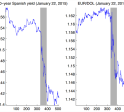Restructuration de la dette grecque : un débat difficile sur le statut de créancier privilégié de la BCE et du FMI
Par Christophe Destais
L’inéluctable restructuration de la dette grecque conduira soit à un transfert de charges vers les États membres de la zone Euro, soit à un abandon au moins partiel par le FMI et/ou la BCE de leur statut de créanciers privilégiés.




.png)





.bmp)
